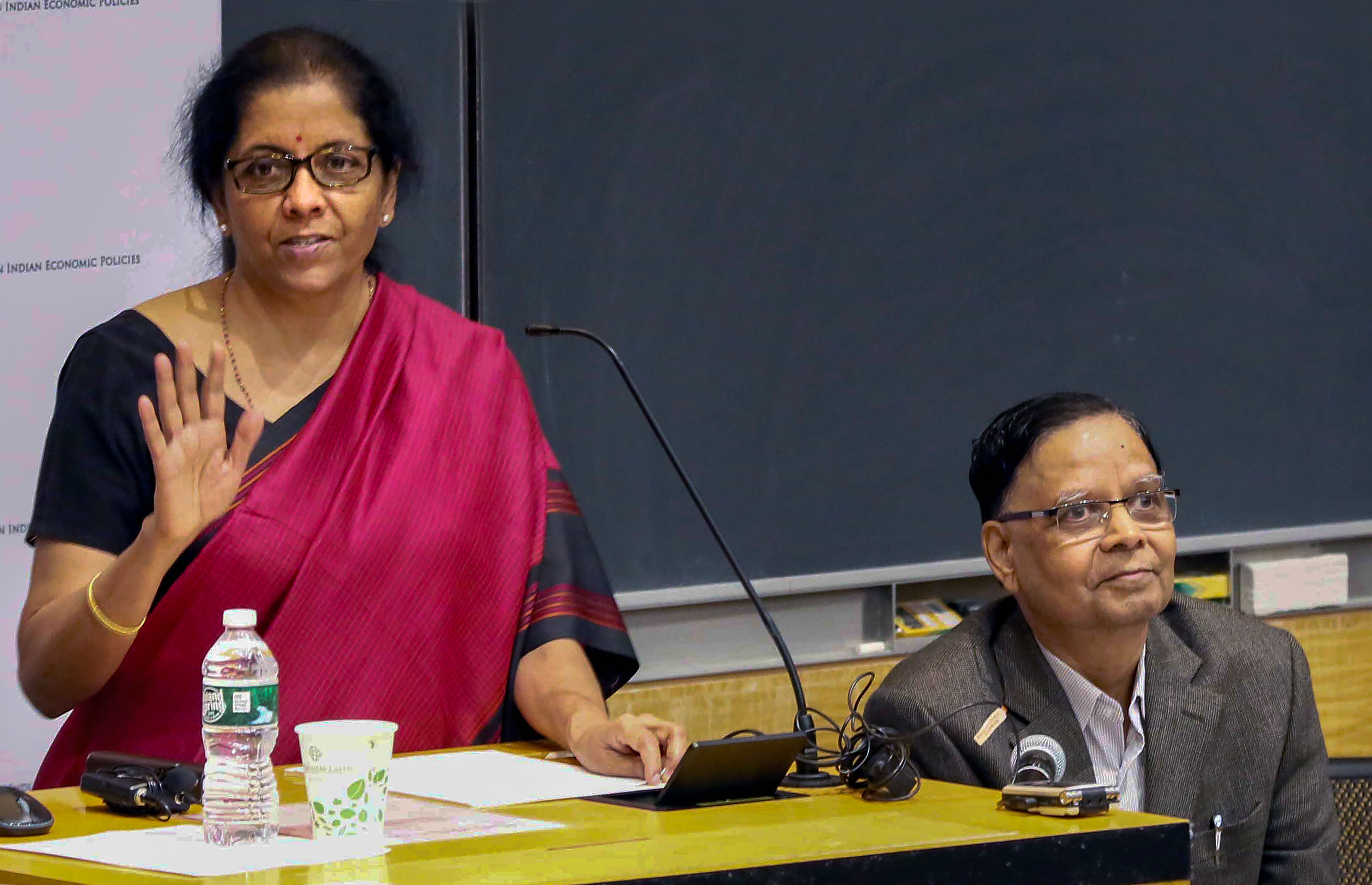Indian public sector banks had the 'worst phase' under the combination of former Prime Minister Manmohan Singh and RBI governor Raghuram Rajan, finance minister Nirmala Sitharaman said at a lecture in Columbia University on Tuesday.
The finance minister said giving all public sector banks a lifeline is today her primary duty.
'I'm taking a minute to respond. I do respect Raghuram Rajan as a great scholar who chose to be in the central bank in India at a time when the Indian economy was all buoyant,' Sitharaman said during the lecture organised by the Deepak and Neera Raj Centre on Indian Economic Policies at the prestigious American university.
Sitharaman was asked about Rajan's comments during a recent lecture at Brown University when he mentioned that in its first term, the Narendra Modi government had not done better on the economy because the government was extremely centralised and the leadership did not appear to have a consistent articulated vision on how to achieve economic growth. She remarked that there were major issues with bank loans during Rajan's tenure as the central bank's head.
'It was in Rajan's time as governor of the Reserve Bank that loans were given just based on phone calls from crony leaders and public sector banks in India till today are depending on the government's equity infusion to get out of that mire,' she said.
'Dr Singh was the Prime Minister and I'm sure Dr Rajan will agree that Dr Singh would have had a consistent articulated vision' for India,' she said amid laughter in the audience.
There is growing consensus that India is in the midst of an economic slowdown and demand has slumped. The Prime Minister's chief economic adviser Bibek Debroy has also blamed the implementation of the GST as one of the reasons for the current slump in demand and production across sectors, among these automobiles and fast moving consumer goods. There is also the worry over unemployment.
Sitharaman's policies have not only been criticised by the Congress, but also her husband, Parakala Prabhakar, who wrote in an editorial in The Hindu that the Narendra Modi government should 'wholly embrace' the 1991 model evolved by then Prime Minister P.V. Narasimha Rao and his finance minister Manmohan Singh to address the current economic slowdown.
It should be noted that Sitharaman in her address in New York was referring to Manmohan Singh's tenure as Prime Minister, not as the finance minister.
At the New York event on Tuesday, Sitharaman thanked Rajan for doing an asset quality review when he was the RBI governor, but added that people should know why the banks are in poor health and from where it has been inherited.
She said: 'With due respect, I'm not making fun of anybody but I certainly want to put this forward for a comment which has come like this. I have no reason to doubt that Rajan feels for every word of what he is saying. And I'm here today, giving him his due respect, but also placing the fact before you that Indian public sector banks did not have a worse phase than when the combination of Singh and Rajan, as Prime Minister and the governor of Reserve Bank, had. At that time, none of us knew about it,' she said.
The event was also attended by former Niti Aayog vice-chairman Arvind Panagariya, professor and eminent economist Jagdish Bhagwati and India's consul-general in New York, Sandeep Chakravorty.
Sitharaman said: 'While economists can take a view of what prevails today or prevailed years ago, but I will also want answers for the time when Rajan was in the governor's post speaking about the Indian banks, for which today to give a lifeline is the primary duty of the finance minister of India. And the lifeline-kind of an emergency has not come overnight.”
Responding to the question, Sitharaman pointed out that if there is a feeling that there's been a centralised leadership now, 'I'd like to say that very democratised leadership led to a whole lot of corruption. Very democratised leadership. The Prime Minister, after all, is the first among equals in any cabinet'.
'You need to have a country as diverse as India with an effective leadership. A rather too democratic leadership, which probably will have the approval of quite a lot of liberals, I'm afraid, left behind such a nasty stink of corruption, which we are cleaning up even today,' she said.











